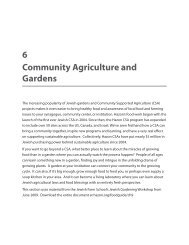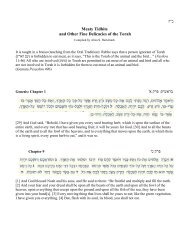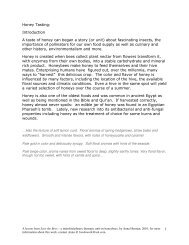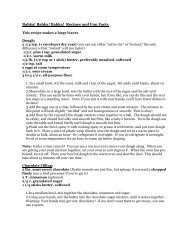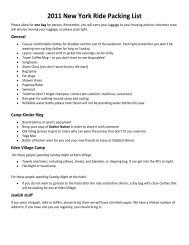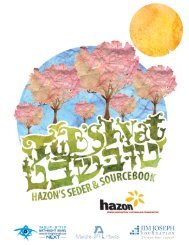FAIR TRADE AND JEWISH VALUES MATRIX - Hazon
FAIR TRADE AND JEWISH VALUES MATRIX - Hazon
FAIR TRADE AND JEWISH VALUES MATRIX - Hazon
You also want an ePaper? Increase the reach of your titles
YUMPU automatically turns print PDFs into web optimized ePapers that Google loves.
<strong>FAIR</strong> <strong>TRADE</strong> PRINCIPLES <strong>AND</strong> <strong>JEWISH</strong> <strong>VALUES</strong><br />
Fair Trade Principle Jewish Value Jewish Text<br />
Provide Fair and Timely<br />
Wages<br />
Prohibit Child Labor<br />
Provide Healthy and Safe<br />
Working Conditions<br />
Preserve and Respect<br />
Cultural Identity<br />
Linat Sachar - Pay wages<br />
in a timely manner<br />
Ona’ah – Do not deceive or<br />
defraud<br />
Osek – Prohibition to<br />
oppress workers<br />
Tzelem Elohim – Sanctity<br />
of all humans, made in the<br />
Divine image<br />
Ahavat Ger - Love the<br />
stranger as Yourself<br />
Right to Education<br />
Ma’akeh Le-gagechah –<br />
Mitzvah to protect people<br />
from deteriorating housing<br />
Umot ha-Olam – Respect<br />
for other nations<br />
You shall not abuse a needy or destitute laborer, whether a fellow countryman or a<br />
stranger in one of the communities of your land. You must pay his wages on the same<br />
day, before the sun sets, for he is needs and his life depends on it. Deut. 24:14-15:<br />
It is forbidden to cheat people in buying or selling or to deceive them, whether they are<br />
Jewish or gentile – they are equal in measure. Rambam, Mishneh Torah, Hilchot<br />
Mechirah 18:1<br />
Whoever withholds an employee’s wages, it is as though he had taken the person’s<br />
life from him. Talmud, Baba Mezia 112A:<br />
Beloved is all humankind for they were made b'tzelem Elohim (in the image of Gd).<br />
Doubly beloved are they, for they were told that they were made in the image of Gd.<br />
As it says: "In the image of Gd was humankind made." Mishnah, Pirkei Avot 3:14:<br />
Gd upholds the cause of the orphan and the widow, and befriends the stranger,<br />
providing him/her with food and clothing. -- You too must befriend the stranger, for<br />
you were strangers in the land of Egypt. Genesis 9:6); Deuteronomy 10:18-19<br />
The breath of school children is the reason for the world’s existence. Maimonides,<br />
The Laws of Torah Study, 2:1<br />
It is a positive commandment to eliminate every hazard that endangers life… If one<br />
did not eliminate it, but preserved the hazards that cause danger, one has overlooked<br />
a positive commandment and transgressed ―you shall not bring blood-guilt into your<br />
house. Shulchan Aruch, Choshen Mishpat, (427:8)<br />
When you build a new house, you shall make a parapet for your roof, so that you do<br />
not bring bloodguilt on your house if anyone should fall from it. Deuteronomy 22:8<br />
A gem in the mouths of the Rabbis of Yavneh: I am God's creature and my fellow is<br />
Gd's creature. My work is in the city and their work is in the field. I rise early for my<br />
work and they rise early for their work. Just they do not presume to do my work, so I<br />
do not presume to do their work. Will you say, I do (learn) much and they do (learn)<br />
little We have a tradition: One may do much or one may do little; it is all the same,<br />
provided one directs one's heart to heaven. Brachot 17a<br />
Come and learn. Human dignity is so important that it supersedes even a Biblical<br />
prohibition. Brachot, 19b<br />
© July 2011 www.fairtradejudaica.org
Cultivate Environmental<br />
Stewardship/Sustainability<br />
-<br />
Support Community<br />
Development/Sustainability<br />
-<br />
Support Organizational<br />
Integrity and<br />
Transparency<br />
-<br />
Bal Tashchit - Do not waste<br />
or destroy<br />
L’Avda U’lshamra – Till and<br />
Protect the Land<br />
Tzedakah – Obligation for<br />
righteous giving<br />
Ona’at Mamom – Do not<br />
deceive<br />
When God created the first human beings, God led them around all the trees of the<br />
Garden of Eden and said: ―Look at My works! See how beautiful they are—how<br />
excellent! For your sake I created them all. Take care, therefore, that you do not spoil<br />
and destroy My world; for if you do, there will be no one else to repair it.‖ [adapted<br />
Translation by AJWS] Ecclesiastes Rabbah 7:13<br />
Whoever breaks vessels, or tears garments, or destroys a building, or clogs a well, or<br />
does away with food in a destructive manner violates the negative mitzvah of bal<br />
Tashchit. Rambam, Hilkhot Melakhim 6:10<br />
Gd placed Adam in the Garden of Eden to till it and tend it. Genesis 2:15:<br />
The highest level of tzedakah is when you support someone by giving them a gift, or a<br />
loan, or enter into a partnership with them, or create a job so that they can support<br />
themselves until they no longer need to depend upon others. Maimonides, Mishneh<br />
Torah 10:7-1<br />
Do not let your fellow slip down until they fall completely, for then it will be difficult to<br />
raise them; rather, strengthen your fellow as they begin to fall. To what is this<br />
comparable To a burden upon a donkey. While it is still on the donkey, one person<br />
can hold it and set it in place. If it falls to the earth, even five people cannot set it<br />
back. Rashi, Leviticus 25:35 (cf. Torat Kohanim, Sifre Behar, Chapter 5)<br />
When you sell anything to your neighbor or buy anything from your neighbor, you<br />
shall not deceive one another. Leviticus (25:14):<br />
He who takes up the heave offering went in neither wearing a sleeved cloak, nor<br />
shoes, sandals, phylacteries, nor an amulet-lest he lose all his money and people say:<br />
because a transgression against the chamber did he lose his money, or lest he get<br />
rich, and people say about him ―from the heave offering of the chamber did he get<br />
rich. For a person must give no cause for suspicion to other people, just as he must<br />
give no cause for suspicion for G-D, as it is said And be guiltless towards the Lord and<br />
towards Israle (Num.32:22) And so it says, So shall you find favor and good<br />
understanding in the sight of G-D and humanity (Prov. 3:4). Mishna Sheqalim 3:2<br />
© July 2011 www.fairtradejudaica.org<br />
Special thanks to Maya Bernstein from UpStart Bay Area


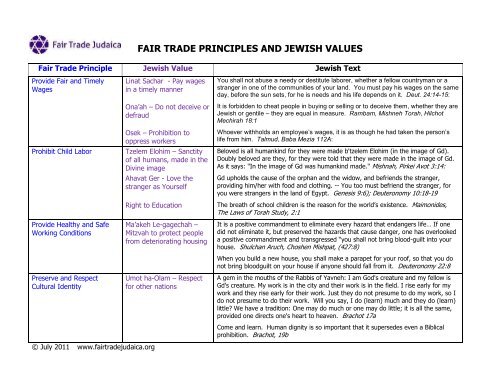
![2011 Israel Sustainable Food Tour Schedule [PDF]. - Hazon](https://img.yumpu.com/50366185/1/190x245/2011-israel-sustainable-food-tour-schedule-pdf-hazon.jpg?quality=85)

